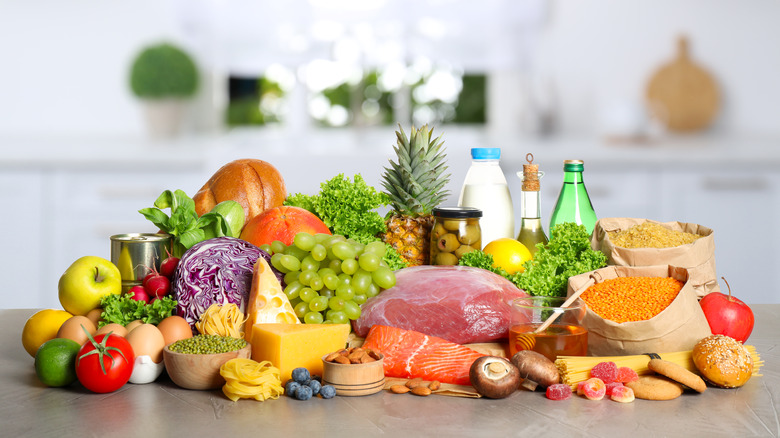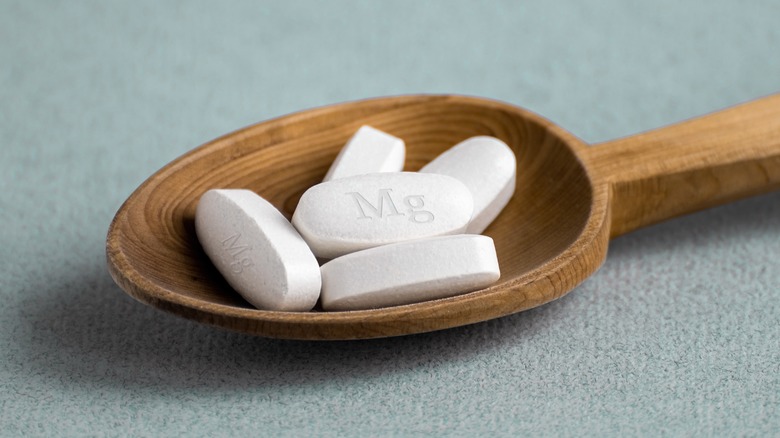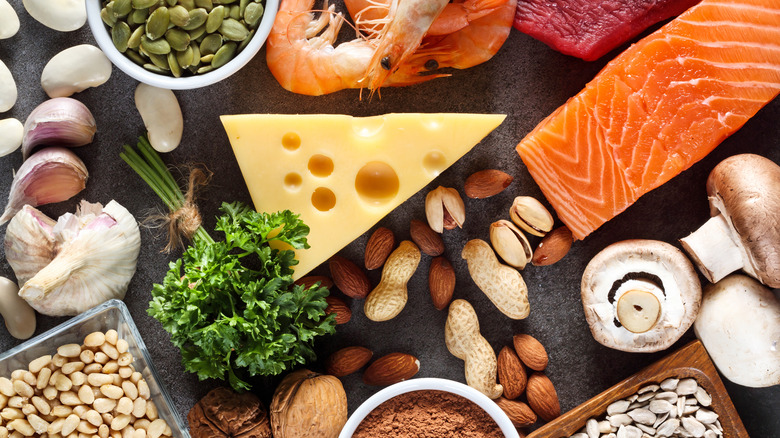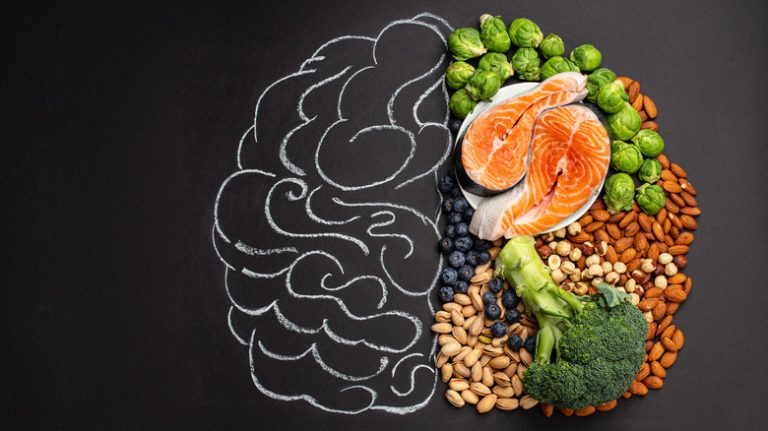Nearly one in 10 Americans experienced depression between 2024 and 2024, according to U.S. News & World Report, and there are many treatment options to help, from medication to therapy and more.
Family medicine specialist Dr. Pauline Jose, Medical Director at Proactive Health Labs and clinical instructor at UCLA, Department of Family Medicine, spoke with Health Digest about the importance of nutrients for those with depression and how we can better protect our mental health through the food we eat.
According to Dr. Jose, our bodies function better when we’re getting optimal levels of nutrients. “Certain conditions like depression can either cause deficiencies of some minerals and nutrients, or the deficiencies can worsen or develop these conditions,” she said. “Studies on depression showed deficiencies of minerals like Magnesium, Chromium, Iron, and Zinc, as well as Copper.”
Dr. Jose also pointed out that vitamins such as B3, B6, B7, B12, and D3 also tend to be low in those who are depressed and diets high in sugar and processed foods can greatly affect our moods. She tells Health Digest, “If we eat too much sugar, for example, or our diets contain mostly junk food and are not nutrient-dense, specifically the above mentioned, our depressive symptoms may get worse or we may feel down and low — even if we are not depressed.”
Top nutrient sources to focus on to reduce depression risk

Dr. Jose told Health Digest that the top four nutrients, and sources of nutrients, that can most reduce the risk of depression are minerals, water, protein, and fats. “Minerals are very important to our bodies, especially when afflicted with ailments like depression,” she notes. While it might seem obvious, Dr. Jose reminds us that water is something we all need and has important benefits. Additionally, protein and vegetables are important for making sure we’re getting vitamins and minerals that can help defend against depression or improve symptoms. “Fats, especially in the form of Omega 3 and 6, are important for our brains to combat depression,” says Dr. Jose.
She also suggests eating a variety of green leafy vegetables, berries, nuts, fruits, grass-fed beef if we are not vegetarians, and fish rich in healthy fats. She recommends taking quality, medical-grade supplements if we can’t get enough nutrients in the food we’re eating.
Dr. Jose additionally points out that probiotics can help ensure that our gut microbiome has the right amount of good bacteria, along with digestive enzymes to help our bodies absorb nutrients and supplements. “It is best to get tested to find out what we are deficient in, especially when we have any conditions that we take medications for which may deplete our vital nutrients,” she said.
Minerals to include in your daily regimen

Knowing which supplements to focus on to improve your mood might feel overwhelming. But Dr. Jose recommends six specific minerals that are proven to be effective. Magnesium is one such mineral. “Several studies have shown an improvement in the severity of symptoms of depression when study participants were given 125-300 mg of magnesium with each meal and at bedtime. Foods containing magnesium include spinach, pumpkin seeds, yogurt, kefir, almonds, black beans, avocado, figs, dark chocolate and bananas,” she explains.
Another important mineral is chromium. Dr. Jose points to a study that found that 70% of participants saw an improvement in their depressive symptoms when consuming 600 micrograms of chromium picolinate daily, which can be found in broccoli, sweet potatoes, free-range eggs, oats, corn, and grass-fed beef.
Iron is important to focus on, too, since low levels of iron can cause depression, apathy, and fatigue. It also helps keep the brain oxygenated and functioning well. “If you are depressed, you should check your iron levels,” Dr. Jose told Health Digest. “Keep in mind, many women tend to have a higher chance of iron deficiency due to losing blood during their menstrual cycles.” Good sources of iron include red meat, poultry, pork, seafood, spinach (and other leafy greens), beans, peas, cherimoyas, and iron-fortified cereals.
Since depression could be caused by oxidative stress, antioxidants can be powerful. An important one is selenium, a mineral shown in multiple studies to improve mood and anxiety in those with depression. You can find selenium in Brazil nuts, chicken, halibut, yellowfin tuna, and sardines.
Don’t forget about trace minerals

Evan Lorne/Shutterstock
Trace minerals, like zinc and copper, are essential to our bodily functioning and important for preventing depression. “[Zinc] is involved in over 300 reactions in the body and is abundant in the brain,” said Dr. Jose. “Many clinical studies have been done to determine the relationship between zinc and depression. Zinc levels are generally low in those with major depression. Zinc supplementation along with antidepressant therapy has been studied and has shown benefits.” Lamb, grass-fed beef, mushrooms, pumpkin seeds, chickpeas, spinach, and chicken are all good sources of zinc.
Copper is another one to remember. “This mineral is important in depression because it is a component of the enzymes that metabolize the brain chemicals that help you respond to stress, feel happy, and be alert,” Dr. Jose said. “These enzymes, and the associated chemicals, are responsible for the causes and treatment of anxiety and depression.” You can find copper in beef liver, sunflower seeds, almonds, lentils, dark chocolate, and asparagus.
Vitamins are necessary, too

Prostock-studio/Shutterstock
If you’ve ever looked at the vitamin section in your local pharmacy, it can feel hard to know where to begin. But Dr. Jose recommends focusing on two in particular: vitamins B and C. “Deficiencies in various vitamins, including B vitamins, are reported to have a negative effect on the brain,” she said. There are eight different B vitamins that can be found in a variety of foods. She added, “If you are vegan or vegetarian, you must be especially proactive about making sure you get enough B12 (which is mainly found in animal foods).”
And don’t forget about vitamin C, a lack of which has been shown to cause depression. Getting an assortment of fruits and vegetables each day can ensure you’re getting enough. Foods high in vitamin C include oranges, grapefruit, watermelon, papaya, tomatoes, spinach, green and red peppers, Brussels sprouts, and cabbage.
Dr. Pauline Jose, MD was trained in family medicine at The Brooklyn Hospital in Brooklyn, NY. She practices functional medicine at Proactive Health Labs where she is the medical education director. She has a primary care practice in East Los Angeles where she takes care of patients with diabetes, hypertension, hyperlipidemia and other chronic illnesses. She is on staff at Cedars Sinai Medical Center in Los Angeles. You can follow Proactive Health Labs on Instagram and find Dr. Jose on LinkedIn.



